

SUBSCRIBE TO OUR FREE NEWSLETTER
Daily news & progressive opinion—funded by the people, not the corporations—delivered straight to your inbox.
5
#000000
#FFFFFF
To donate by check, phone, or other method, see our More Ways to Give page.


Daily news & progressive opinion—funded by the people, not the corporations—delivered straight to your inbox.

Google CEO Sundar Pichai departs federal court on October 30, 2023 in Washington, D.C.
"This decision will fundamentally reshape Google's monopoly," said one antitrust advocate.
A federal jury ruled Monday that Google's highly profitable Android app store is an unlawful monopoly, a landmark antitrust decision that one observer hailed as "a message that justice can prevail in the fight against Big Tech's outsized power over our lives."
The ruling stemmed from an antitrust lawsuit brought by Epic Games, a video game maker that accused Google of using its dominant market position to crush competition and drive up fees for app developers.
The Google Play Store has become one of the tech giant's most profitable businesses, despite company executives' previous claims that the platform "would not be a profit center."
In a statement following Monday's decision, Epic Games said that "over the course of the trial we saw evidence that Google was willing to pay billions of dollars to stifle alternative app stores by paying developers to abandon their own store efforts and direct distribution plans, and offering highly lucrative agreements with device manufacturers in exchange for excluding competing app stores."
"These deals were meant to cement Google's dominance as the only app store in town—and it worked. More than 95% of apps are distributed through the Play Store on Android," the statement continued. "The evidence presented in this case demonstrates the urgent need for legislation and regulations that address Apple and Google strangleholds over smartphones, including with promising legislation in progress right now with the Digital Markets, Competition, and Consumer Bill in the U.K. and the Digital Markets Act in the E.U."
Lee Hepner, an attorney for the American Economic Liberties Project, toldThe Wall Street Journal that "it's a big deal that a jury is saying, 'Yes, Google has a monopoly and it has illegally maintained a monopoly."
"A jury was readily able to call a spade a spade," said Hepner.
"This is a major victory in the fight against one of Google's most profitable monopolies."
Monday's win for Epic Games caps off a yearslong legal battle that the company waged against Apple and Google, which is also currently facing a historic antitrust case brought by the U.S. Justice Department.
In 2020, as The Washington Postreported Monday, "Epic revolted against Apple and Google's payment-sharing systems for app developers by tweaking its popular Fortnite app so users could pay Epic directly."
"First Apple, then Google, booted Fortnite from their app stores for violating their rules," the Post noted. "Epic sued both companies, arguing the rules violated the Sherman Antitrust Act... Unlike Apple, Google allows people to download apps onto phones running its Android operating system without going through its official app store, but the company strikes deals with phone manufacturers to favor Google's official app store."
A federal appeals court earlier this year ruled against Epic Games in the Apple case, and Epic Games has asked the Supreme Court to take up the case.
In January, an Obama-appointed federal judge will determine the extent to which Google will have to alter its business in response to the jury decision.
Katherine Van Dyck, a senior legal counsel at the American Economic Liberties Project, urged the judge to "craft a strong remedy to ensure that app markets are open, accessible, and competitive for honest businesses across the tech industry."
"This is a major victory in the fight against one of Google's most profitable monopolies," Van Dyck said of Monday's ruling. "A jury of 9 has found that Google's sweetheart deals, bribes, and monopoly profits are illegal."
"Epic's decision to forgo monetary damages and instead pursue injunctive relief," Van Dyck added, "all but ensure that this decision will fundamentally reshape Google's monopoly, which it has leveraged to exploit app developers and stifle innovation."
Trump and Musk are on an unconstitutional rampage, aiming for virtually every corner of the federal government. These two right-wing billionaires are targeting nurses, scientists, teachers, daycare providers, judges, veterans, air traffic controllers, and nuclear safety inspectors. No one is safe. The food stamps program, Social Security, Medicare, and Medicaid are next. It’s an unprecedented disaster and a five-alarm fire, but there will be a reckoning. The people did not vote for this. The American people do not want this dystopian hellscape that hides behind claims of “efficiency.” Still, in reality, it is all a giveaway to corporate interests and the libertarian dreams of far-right oligarchs like Musk. Common Dreams is playing a vital role by reporting day and night on this orgy of corruption and greed, as well as what everyday people can do to organize and fight back. As a people-powered nonprofit news outlet, we cover issues the corporate media never will, but we can only continue with our readers’ support. |
A federal jury ruled Monday that Google's highly profitable Android app store is an unlawful monopoly, a landmark antitrust decision that one observer hailed as "a message that justice can prevail in the fight against Big Tech's outsized power over our lives."
The ruling stemmed from an antitrust lawsuit brought by Epic Games, a video game maker that accused Google of using its dominant market position to crush competition and drive up fees for app developers.
The Google Play Store has become one of the tech giant's most profitable businesses, despite company executives' previous claims that the platform "would not be a profit center."
In a statement following Monday's decision, Epic Games said that "over the course of the trial we saw evidence that Google was willing to pay billions of dollars to stifle alternative app stores by paying developers to abandon their own store efforts and direct distribution plans, and offering highly lucrative agreements with device manufacturers in exchange for excluding competing app stores."
"These deals were meant to cement Google's dominance as the only app store in town—and it worked. More than 95% of apps are distributed through the Play Store on Android," the statement continued. "The evidence presented in this case demonstrates the urgent need for legislation and regulations that address Apple and Google strangleholds over smartphones, including with promising legislation in progress right now with the Digital Markets, Competition, and Consumer Bill in the U.K. and the Digital Markets Act in the E.U."
Lee Hepner, an attorney for the American Economic Liberties Project, toldThe Wall Street Journal that "it's a big deal that a jury is saying, 'Yes, Google has a monopoly and it has illegally maintained a monopoly."
"A jury was readily able to call a spade a spade," said Hepner.
"This is a major victory in the fight against one of Google's most profitable monopolies."
Monday's win for Epic Games caps off a yearslong legal battle that the company waged against Apple and Google, which is also currently facing a historic antitrust case brought by the U.S. Justice Department.
In 2020, as The Washington Postreported Monday, "Epic revolted against Apple and Google's payment-sharing systems for app developers by tweaking its popular Fortnite app so users could pay Epic directly."
"First Apple, then Google, booted Fortnite from their app stores for violating their rules," the Post noted. "Epic sued both companies, arguing the rules violated the Sherman Antitrust Act... Unlike Apple, Google allows people to download apps onto phones running its Android operating system without going through its official app store, but the company strikes deals with phone manufacturers to favor Google's official app store."
A federal appeals court earlier this year ruled against Epic Games in the Apple case, and Epic Games has asked the Supreme Court to take up the case.
In January, an Obama-appointed federal judge will determine the extent to which Google will have to alter its business in response to the jury decision.
Katherine Van Dyck, a senior legal counsel at the American Economic Liberties Project, urged the judge to "craft a strong remedy to ensure that app markets are open, accessible, and competitive for honest businesses across the tech industry."
"This is a major victory in the fight against one of Google's most profitable monopolies," Van Dyck said of Monday's ruling. "A jury of 9 has found that Google's sweetheart deals, bribes, and monopoly profits are illegal."
"Epic's decision to forgo monetary damages and instead pursue injunctive relief," Van Dyck added, "all but ensure that this decision will fundamentally reshape Google's monopoly, which it has leveraged to exploit app developers and stifle innovation."
A federal jury ruled Monday that Google's highly profitable Android app store is an unlawful monopoly, a landmark antitrust decision that one observer hailed as "a message that justice can prevail in the fight against Big Tech's outsized power over our lives."
The ruling stemmed from an antitrust lawsuit brought by Epic Games, a video game maker that accused Google of using its dominant market position to crush competition and drive up fees for app developers.
The Google Play Store has become one of the tech giant's most profitable businesses, despite company executives' previous claims that the platform "would not be a profit center."
In a statement following Monday's decision, Epic Games said that "over the course of the trial we saw evidence that Google was willing to pay billions of dollars to stifle alternative app stores by paying developers to abandon their own store efforts and direct distribution plans, and offering highly lucrative agreements with device manufacturers in exchange for excluding competing app stores."
"These deals were meant to cement Google's dominance as the only app store in town—and it worked. More than 95% of apps are distributed through the Play Store on Android," the statement continued. "The evidence presented in this case demonstrates the urgent need for legislation and regulations that address Apple and Google strangleholds over smartphones, including with promising legislation in progress right now with the Digital Markets, Competition, and Consumer Bill in the U.K. and the Digital Markets Act in the E.U."
Lee Hepner, an attorney for the American Economic Liberties Project, toldThe Wall Street Journal that "it's a big deal that a jury is saying, 'Yes, Google has a monopoly and it has illegally maintained a monopoly."
"A jury was readily able to call a spade a spade," said Hepner.
"This is a major victory in the fight against one of Google's most profitable monopolies."
Monday's win for Epic Games caps off a yearslong legal battle that the company waged against Apple and Google, which is also currently facing a historic antitrust case brought by the U.S. Justice Department.
In 2020, as The Washington Postreported Monday, "Epic revolted against Apple and Google's payment-sharing systems for app developers by tweaking its popular Fortnite app so users could pay Epic directly."
"First Apple, then Google, booted Fortnite from their app stores for violating their rules," the Post noted. "Epic sued both companies, arguing the rules violated the Sherman Antitrust Act... Unlike Apple, Google allows people to download apps onto phones running its Android operating system without going through its official app store, but the company strikes deals with phone manufacturers to favor Google's official app store."
A federal appeals court earlier this year ruled against Epic Games in the Apple case, and Epic Games has asked the Supreme Court to take up the case.
In January, an Obama-appointed federal judge will determine the extent to which Google will have to alter its business in response to the jury decision.
Katherine Van Dyck, a senior legal counsel at the American Economic Liberties Project, urged the judge to "craft a strong remedy to ensure that app markets are open, accessible, and competitive for honest businesses across the tech industry."
"This is a major victory in the fight against one of Google's most profitable monopolies," Van Dyck said of Monday's ruling. "A jury of 9 has found that Google's sweetheart deals, bribes, and monopoly profits are illegal."
"Epic's decision to forgo monetary damages and instead pursue injunctive relief," Van Dyck added, "all but ensure that this decision will fundamentally reshape Google's monopoly, which it has leveraged to exploit app developers and stifle innovation."
"Thank you to the hundreds of thousands of Americans across the country who are standing up and speaking out for our voting rights, fundamental freedoms, and essential services like Social Security and Medicare."
In communities large and small across the United States on Saturday, hundreds of thousands of people collectively took to the streets to make their opposition to President Donald Trump heard.
The people who took part in the organized protests ranged from very young children to the elderly and their message was scrawled on signs of all sizes and colors—many of them angry, some of them funny, but all in line with the "Hands Off" message that brought them together.
"Thank you to the hundreds of thousands of Americans across the country who are standing up and speaking out for our voting rights, fundamental freedoms, and essential services like Social Security and Medicare," said the group Stand Up America as word of the turnout poured in from across the country.
A relatively small, but representative sample of photographs from various demonstrations that took place follows.
Demonstrators gather on Boston Common, cheering and chanting slogans, during the nationwide "Hands Off!" protest against US President Donald Trump and his advisor, Tesla CEO Elon Musk, in Boston, Massachusetts on April 5, 2025. (Photo by Joseph Prezioso / AFP)

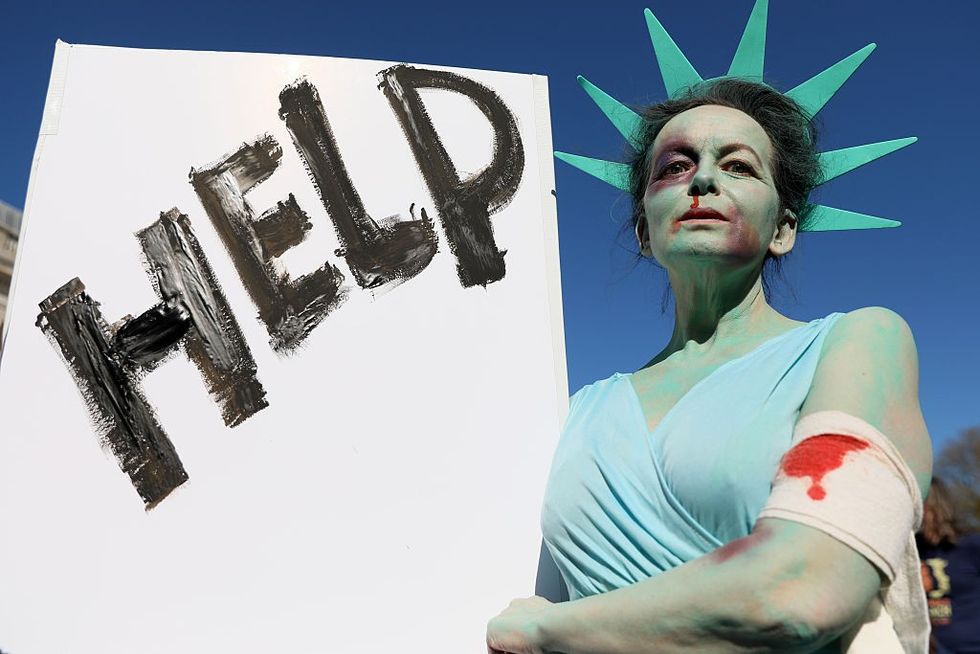






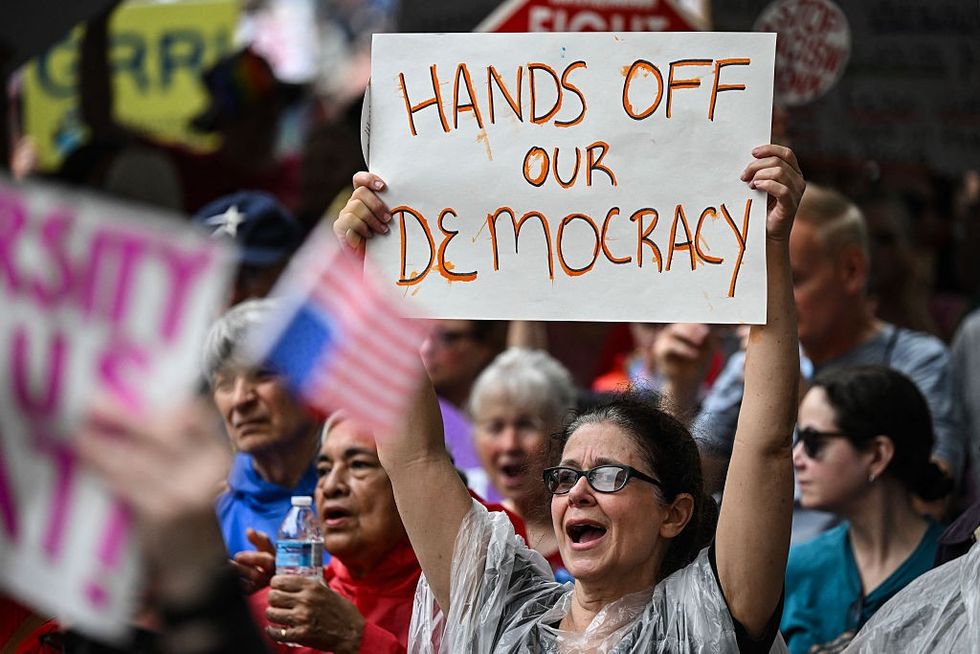

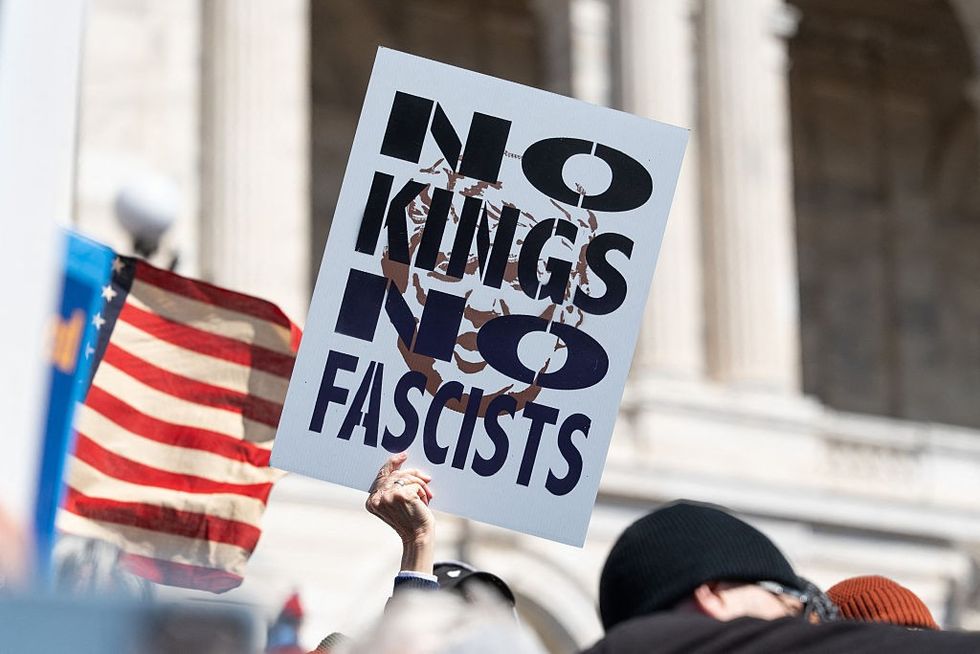

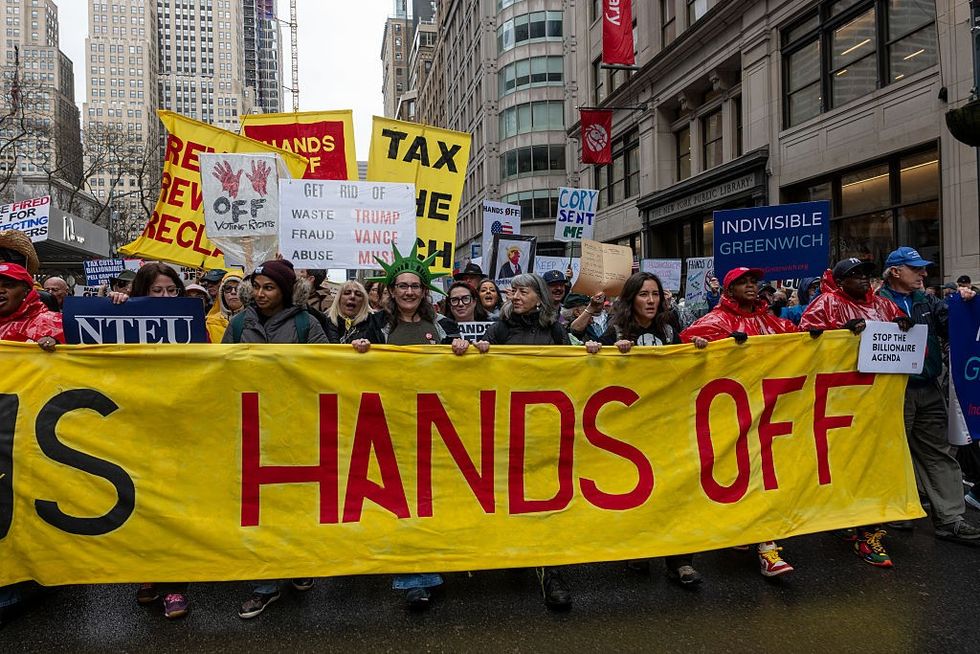



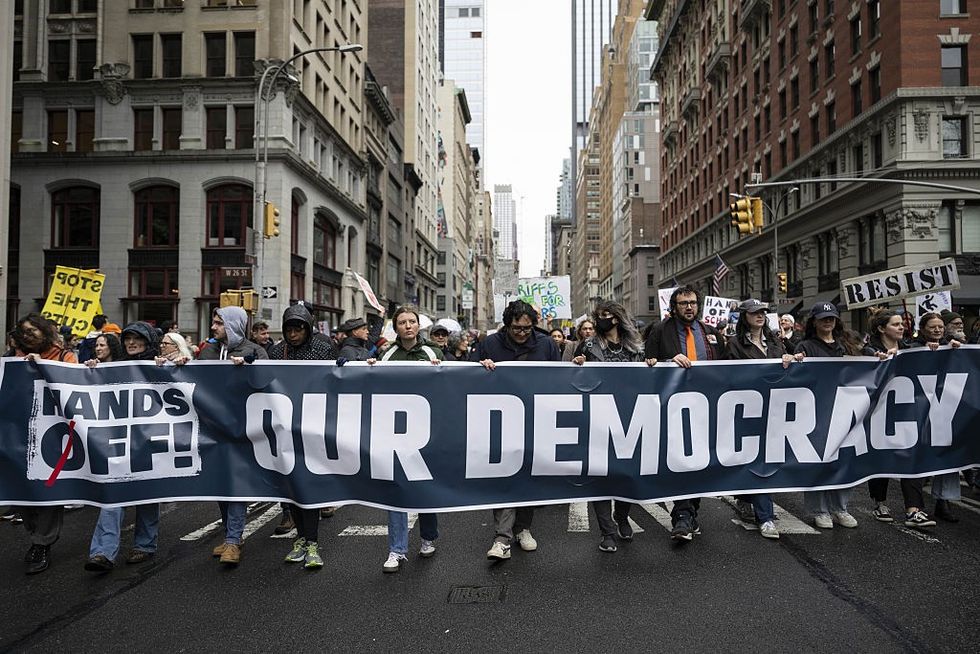

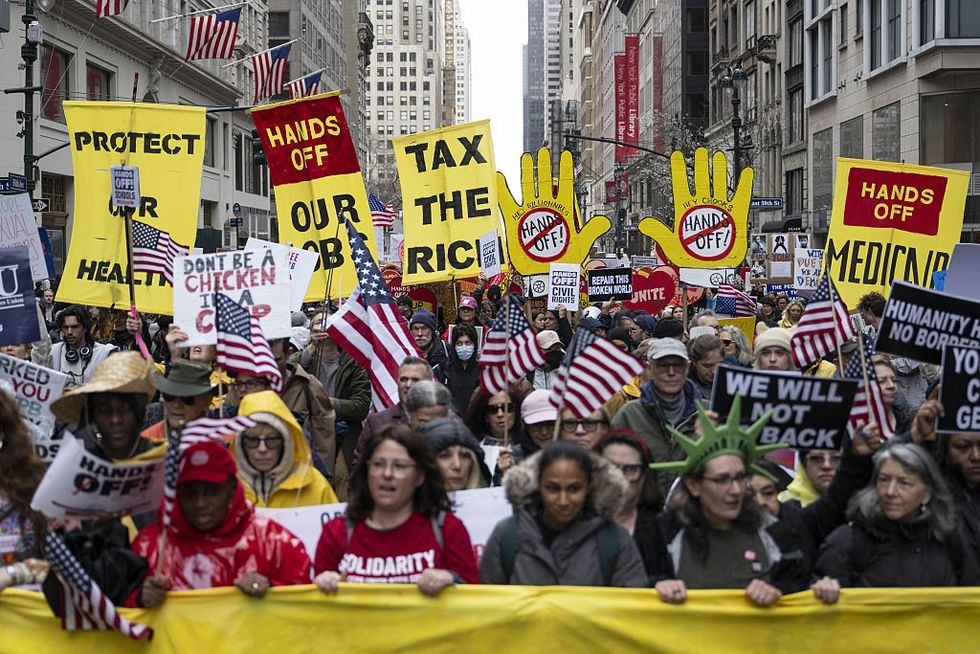
"Everyone involved in this crime against humanity, and everyone who covered it up, would face prosecution in a world that had any shred of dignity left."
A video presented to officials at the United Nations on Friday and first made public Saturday by the New York Times provides more evidence that the recent massacre of Palestinian medics in Gaza did not happen the way Israeli government claimed—the latest in a long line of deception when it comes to violence against civilians that have led to repeated accusations of war crimes.
The video, according to the Palestine Red Crescent Society (PRCS), was found on the phone of a paramedic found in a mass grave with a bullet in his head after being killed, along with seven other medics, by Israeli forces on March 23. The eight medics, buried in the shallow grave with the bodies riddled with bullets, were: Mustafa Khafaja, Ezz El-Din Shaat, Saleh Muammar, Refaat Radwan, Muhammad Bahloul, Ashraf Abu Libda, Muhammad Al-Hila, and Raed Al-Sharif. The video reportedly belonged to Radwan. A ninth medic, identified as Asaad Al-Nasasra, who was at the scene of the massacre, which took place near the southern city of Rafah, is still missing.
The PRCS said it presented the video—which refutes the explanation of the killings offered by Israeli officials—to members of the UN Security Council on Friday.
"They were killed in their uniforms. Driving their clearly marked vehicles. Wearing their gloves. On their way to save lives," Jonathan Whittall, head of the UN's humanitarian affairs office in Palestine, said last week after the bodies were discovered. Some of the victims, according to Gaza officials, were found with handcuffs still on them and appeared to have been shot in the head, execution-style.
The Israeli military initially said its soldiers "did not randomly attack" any ambulances, but rather claimed they fired on "terrorists" who approached them in "suspicious vehicles." Lt. Col. Nadav Shoshani, an IDF spokesperson, said the vehicles that the soldiers opened fire on were driving with their lights off and did not have clearance to be in the area. The video evidence directly contradicts the IDF's version of events.
As the Times reports:
The Times obtained the video from a senior diplomat at the United Nations who asked not to be identified to be able to share sensitive information.
The Times verified the location and timing of the video, which was taken in the southern city of Rafah early on March 23. Filmed from what appears to be the front interior of a moving vehicle, it shows a convoy of ambulances and a fire truck, clearly marked, with headlights and flashing lights turned on, driving south on a road to the north of Rafah in the early morning. The first rays of sun can be seen, and birds are chirping.
In an interview with Drop Site News published Friday, the only known paramedic to survive the attack, Munther Abed, explained that he and his colleagues "were directly and deliberately shot at" by the IDF. "The car is clearly marked with 'Palestinian Red Crescent Society 101.' The car's number was clear and the crews' uniform was clear, so why were we directly shot at? That is the question."
The video's release sparked fresh outrage and demands for accountability on Saturday.
"The IDF denied access to the site for days; they sent in diggers to cover up the massacre and intentionally lied about it," said podcast producer Hamza M. Syed in reaction to the new revelations. "The entire leadership of the Israeli army is implicated in this unconscionable war crime. And they must be prosecuted."
"Everyone involved in this crime against humanity, and everyone who covered it up, would face prosecution in a world that had any shred of dignity left," said journalist Ryan Grim of DropSite News.
"They're dismantling our country. They're looting our government. And they think we'll just watch."
In communities across the United States and also overseas, coordinated "Hands Off" protests are taking place far and wide Saturday in the largest public rebuke yet to President Donald Trump and top henchman Elon Musk's assault on the workings of the federal government and their program of economic sabotage that is sacrificing the needs of working families to authoritarianism and the greed of right-wing oligarchs.
According to the organizers' call to action:
They're dismantling our country. They’re looting our government. And they think we'll just watch.
On Saturday, April 5th, we rise up with one demand: Hands Off!
This is a nationwide mobilization to stop the most brazen power grab in modern history. Trump, Musk, and their billionaire cronies are orchestrating an all-out assault on our government, our economy, and our basic rights—enabled by Congress every step of the way. They want to strip America for parts—shuttering Social Security offices, firing essential workers, eliminating consumer protections, and gutting Medicaid—all to bankroll their billionaire tax scam.
They're handing over our tax dollars, our public services, and our democracy to the ultra-rich. If we don't fight now, there won’t be anything left to save.
More than 1,000 "Hands Off!" demonstrations—organized by a large coalition of unions, progressive advocacy groups, and pro-democracy watchdogs—first kicked off Saturday in European, followed by East Coast communities in the U.S., and were set to continue throughout the day at various times, depending on location. See here for a list of scheduled "Hands Off" events—or schedule one in your community.
"The United States has a president, not a king," said the progressive advocacy group People's Action, one of the group's involved in the actions, in an email to supporters on Saturday just as protest events kicked off in hundreds of cities and communities. "Donald Trump has, by every measure, been working to make himself a king. He has become unanswerable to the courts, Congress, and the American people."
Citing the Republican president's thirst for "power and greed," the group explained why organized pressure must be built and sustained against the administration, especially at the conclusion of a week in which the global economy was spun into disarray by Trump's tariff announcement, his attack on the rule of law continued, and the twice-elected president admitted he was "not joking" about the possibility of seeking a third term, which is barred by the constitution.
"He is destroying the economy with tariffs in order to pay for the tax cuts he wants to push through to enrich himself and his billionaire buddies," warned People's Action. "He has ordered the government to round up innocent people off of the streets and put them in detention centers without due process because they dared to speak out using their First Amendment rights. And he is not close to being done—by his own admission, he is planning to run for a third term, which the Constitution does not allow."
Live stream of Hands Off rally in Washington, D.C.:
Below are photo or video dispatches from demonstrations around the world on Saturday. Check back for updates...
United Kingdom
France
Germany
Belgium:
Massachusetts:
Maine:
Washington, D.C.:
New York:
Minnesota:
Michigan:
Ohio:
Colorado:
Pennsylvania:
North Carolina:
The protest organizers warn that what Trump and Musk are up to "is not just corruption" and "not just mismanagement," but something far more sinister.
"This is a hostile takeover," they said, but vowed to fight back. "This is the moment where we say NO. No more looting, no more stealing, no more billionaires raiding our government while working people struggle to survive."